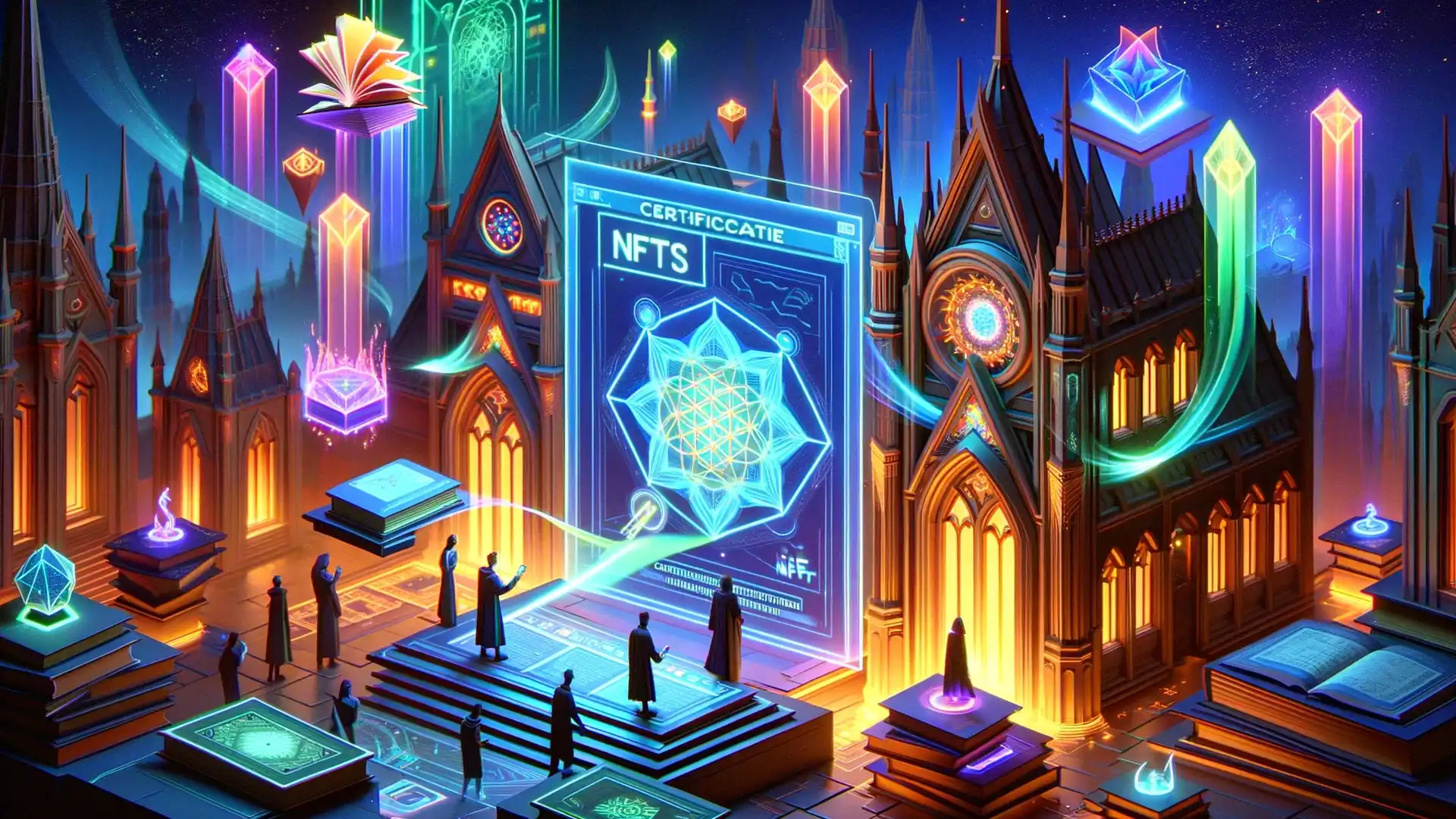Applying NFTs in Professional Training, Certification, and Accreditation

 Author:
Artem Grigoriev
Author:
Artem Grigoriev
Revolutionizing Professional Certification with NFTs: Key Benefits and Applications
Imagine a world where your professional credentials are not just pieces of paper but secure, verifiable digital assets . These assets are accessible from anywhere. Non-fungible tokens (NFTs) are making this innovative vision a reality.
📘 This article complements: "The Complete Guide to NFT Credentials". Explore it to find answers to all your questions;)
At its core, an NFT is a unique digital asset verified through blockchain technology. This ensures authenticity (proof that it's real) and immutability (cannot be changed). In simpler terms, NFTs are like digital certificates that cannot be altered once they are created. Blockchain technology powers this. It records information in a way that makes it nearly impossible to change.
This chapter explores how NFTs are transforming professional certification and accreditation . The global market for blockchain technology is projected to reach $39.7 billion by 2025. This highlights the growing trust and investment in this groundbreaking technology Blockchain Market Growth .
NFTs bring enhanced credibility to the certification process. Each credential stored as an NFT is backed by the secure and decentralized nature of blockchain. This makes it tamper-proof (cannot be faked or altered) and easily verifiable (can be checked for authenticity online). This builds trust between professionals, employers, and institutions. It ensures that credentials are genuine and unalterable.
According to a study by IBM, blockchain can reduce fraud and errors by up to 75% in processes requiring high data integrity IBM Blockchain Benefits . This reduction in fraud saves organizations significant resources. It also protects the reputation of credentialing bodies.
A significant advantage of using NFTs in certification is the simplified verification process . Employers and institutions can quickly verify credentials online. This reduces the administrative burden of cross-checking multiple sources. This is especially crucial in industries where precision and speed are vital.
For instance, the healthcare sector can greatly benefit from the instantaneous verification of qualifications. This ensures that practitioners are certified and capable. Similarly, in the legal field, quick verification of attorneys' licenses can streamline client intake processes. It can also improve court procedures.
Global recognition of NFT credentials is another game-changer. Since NFTs are accessible worldwide, they create a universal standard that transcends borders. This means that no matter where you are in the world, your credentials can be verified and accepted. This eases international mobility and opens up broader career opportunities.
According to the World Economic Forum, blockchain-based credentials can enhance global mobility for professionals . They provide a universally recognized and verifiable form of certification WEF Blockchain in Education . This global recognition is particularly beneficial for fields like engineering and academia. These fields often involve cross-border work and collaboration.
Credential fraud has long plagued various sectors. By providing a tamper-proof record, NFTs drastically reduce the risk of credential misrepresentation (lying about qualifications). This ensures that only authentic credentials are presented. It safeguards the integrity of the certification process.
A report from the Association of Certified Fraud Examiners (ACFE) highlights that credential fraud is a pervasive issue . It costs organizations significant resources each year ACFE Credential Fraud .
💡 Note: NFTs ensure that credentials cannot be forged. This addresses a significant issue in many industries. This provides an additional layer of trust and reliability in the certification process. The transparency of blockchain technology enhances the trustworthiness of credentials. This makes them more appealing to employers and clients.

For instance, in the financial industry, trust and accuracy are paramount. NFTs can help verify the credentials of financial advisors and auditors. This protects consumers and maintains market stability.
NFTs also enhance the efficiency of tracking professional development . These digital tokens can store a comprehensive record of an individual's educational achievements and professional milestones. This facilitates easier monitoring and validation of continuous professional development (ongoing learning and skill improvement). This promotes a culture of lifelong learning.
Such a culture is crucial in today’s rapidly changing job market. Companies that foster continuous learning are 46% more likely to be leaders in their industry, according to a report by Deloitte Deloitte Continuous Learning . This is particularly valuable in technology and healthcare sectors. In these sectors, continuous education is critical to staying current with advances and innovations.
Privacy is another critical benefit of NFTs. Individuals have control over their data . They can decide when and with whom to share their credentials. This enhanced privacy addresses growing concerns about data security and misuse. Essentially, you control your information and can choose who gets to see it.
The European Union’s GDPR framework emphasizes the importance of data privacy. Blockchain can ensure compliance by giving individuals control over their personal data GDPR and Blockchain . In industries like finance and healthcare, personal data security is paramount. NFTs offer a secure method of credential sharing. This complies with stringent privacy regulations.
Supporting lifelong learning and continuous credentialing is a key feature of NFTs. They provide a dynamic way to track and verify ongoing education and skill acquisition. This ensures professionals stay current in their fields.
This chapter emphasizes the importance of staying updated. NFTs facilitate this by offering a transparent and verifiable record of lifelong learning activities. This continuous credentialing is particularly important in fields that require frequent re-certification. For instance, in IT security, professionals must keep up with the latest threats and solutions.
Real-world case studies illustrate the practical applications of NFTs in professional training. For instance, in healthcare, accurate and up-to-date credentials are critical. Similarly, in IT and finance, maintaining verified certifications is essential. These examples show how organizations have successfully implemented NFT-based certification systems. This enhances trust, efficiency, and security.
The MIT Media Lab’s initiative to issue digital diplomas on the blockchain is a pioneering example of this application MIT Digital Diplomas . Another example is the use of NFTs by the University of Nicosia. This institution has been issuing blockchain-verifiable certificates since 2014. This demonstrates the practical application and long-term benefits of this technology.
Integrating NFTs with existing accreditation systems provides a hybrid approach. This approach leverages the strengths of both traditional and digital methods. As blockchain technology advances and adoption increases, NFTs are poised to revolutionize professional certification further. Future trends may include more widespread adoption across industries. Evolving regulatory frameworks will support digital credentials. Additionally, advancements in blockchain technology could lead to even more secure and efficient ways of managing and verifying credentials.
In conclusion, NFTs offer a transformative approach to professional certification . They provide secure, verifiable, and globally recognized credentials. This chapter highlights the practical benefits and real-world applications. It underscores the significant impact NFTs can have on the future of professional training and accreditation. As technology evolves, the adoption of NFTs in professional certification is likely to increase. This offers even greater opportunities for secure and efficient credentialing across a wide range of industries.
💡 Tip: When considering the integration of NFTs in professional certification, evaluate both the technological benefits and the regulatory landscape. This ensures a smooth transition and compliance with legal standards. Understanding the implications of data protection laws like GDPR is crucial for successful implementation. Additionally, engaging with stakeholders, including employers, credentialing bodies, and professionals, can help design a system. This system should meet the needs of all parties involved.

Implementing NFTs in Professional Training: Challenges and Future Directions
Embarking on the exciting journey of integrating NFTs into professional training involves navigating several technical and logistical challenges.
Setting up the blockchain infrastructure is the first crucial step. This process requires collaboration with skilled blockchain developers. They create and manage blockchain systems to generate NFT tokens representing specific credentials. Blockchain is a technology that stores information across many computers, making it hard to change or hack. These tokens must be easily issuable and verifiable within current training frameworks. This ensures seamless integration with existing programs.
According to a comprehensive report by PwC, the blockchain market is expected to boost global GDP by $1.76 trillion by 2030. This indicates significant potential for blockchain applications in various sectors, including professional training PwC Blockchain Report .
Security and authenticity are paramount when dealing with professional credentials. Blockchain technology provides a robust solution, ensuring that NFT-based credentials are tamper-proof and easily verifiable. Once a credential is recorded on the blockchain, it can't be altered or faked. This makes it highly reliable. Advanced cryptographic techniques further strengthen the security of these credentials. The National Institute of Standards and Technology (NIST) highlights the critical importance of cryptographic security. This is essential in maintaining the integrity of blockchain applications NIST Blockchain Security .
However, navigating the legal and ethical landscape is crucial. Implementing NFTs in professional training requires strict adherence to regulatory standards. This is particularly true concerning data protection laws and industry-specific regulations. Clear and comprehensive guidelines must be established for issuing and managing NFTs. This ensures they meet legal standards and protect users' rights. The European Union’s General Data Protection Regulation (GDPR) and the California Consumer Privacy Act (CCPA) are key examples of regulations that must be meticulously considered in the implementation process GDPR Compliance and CCPA Compliance .
Cost efficiency is another significant advantage. NFTs can reduce administrative costs associated with traditional credentialing methods. They automate verification processes and minimize the need for physical documentation. Automation uses technology to perform tasks that usually require human intervention. Blockchain's inherent transparency allows for open and accessible credential records. These can be publicly verified without compromising privacy.
This transparency is key in preventing credential fraud . It makes it straightforward to verify the authenticity of qualifications. A detailed study by the World Economic Forum highlights that blockchain can reduce verification costs and improve efficiency in credentialing WEF Blockchain Benefits .
Incorporating digital badges and decentralized learning records into NFT-based systems provides a holistic view of an individual's skills and achievements. Digital badges are visual representations of specific skills or competencies. They are akin to digital versions of badges earned in scouts or video games. Decentralized records allow for a comprehensive and continuously updated portfolio of learning experiences. This means all your achievements are stored in one place that you control.
💡 Note: Establishing a legal framework for NFT credentials involves ensuring compliance with data protection laws and industry-specific regulations. This is critical for widespread adoption and trust.

This innovative approach aligns perfectly with the concept of micro-credentials. These are smaller, focused qualifications that demonstrate specific skills or knowledge Micro-credentials in Education .
The trustworthiness and accessibility of NFTs are further enhanced by their immutable nature. This ensures that credentials remain reliable and consistent over time. This fosters greater trust between professionals, employers, and certifying bodies. The ease of access to digital credentials simplifies the process of credential verification for employers and educational institutions. Automated re-certification mechanisms can keep credentials current with minimal effort. This streamlines the re-certification process efficiently.
NFTs also have the potential to foster professional networking . They include detailed metadata that links to an individual's professional profiles, portfolios, and social networks. This enhances opportunities for professional connections and collaborations. Tracking lifelong learning through NFTs allows individuals to showcase their continuous professional development. Customizable learning pathways can be designed to meet specific career goals and industry standards. LinkedIn, for example, is exploring the use of blockchain to verify professional credentials. This potentially integrates these advanced features into professional networking platforms LinkedIn Blockchain Integration .
Cross-platform recognition is another significant advantage. NFTs can be used across different educational institutions and professional organizations. This ensures that credentials are universally recognized and accepted. This means that your credentials can be verified and accepted by different organizations, no matter where you obtained them. This interoperability supports greater mobility and flexibility in career development. It allows professionals to seamlessly transition between roles and industries.
Despite these substantial benefits, challenges remain. Technological barriers, resistance to change, and the need for widespread adoption are significant obstacles. Strategies to address these issues include providing comprehensive training on blockchain technology. Demonstrating the tangible benefits of NFT credentials is also crucial. Additionally, fostering collaboration between stakeholders will drive adoption and acceptance.
Looking forward, advancements in interoperability, user interfaces , and broader industry acceptance will shape the future of NFTs in professional training. Enhanced interoperability will allow NFT credentials to be recognized across various platforms. Improved user interfaces will make the technology more accessible and user-friendly. Broader industry acceptance will come as more organizations recognize the value of NFT-based credentials. This will enhance trust, efficiency, and transparency.
According to Gartner, blockchain technology will create $3.1 trillion in business value by 2030. This underscores its transformative potential Gartner Blockchain Forecast .
In conclusion, implementing NFTs in professional training involves overcoming technical, legal, and logistical challenges. However, the potential benefits, including enhanced security, cost efficiency, and global recognition, make it a worthwhile endeavor. This chapter provides a comprehensive understanding of the practical considerations, benefits, and challenges associated with NFTs in professional training. It offers deep insights into their transformative potential and future evolution.
💡 Tip: When implementing NFTs in professional training, consider the benefits of cross-platform recognition. This enhances mobility and flexibility in career development.

Global Recognition of NFT Credentials and the Role of TTP
Why NFT Credentials Are the Best Solution for International Students
Multilingual Support and Cultural Adaptation of NFT Credentials
Cost and Pricing Models for NFT Credentials
Investment Prospects in NFT Credentials: For Educational Institutions and Private Investors
